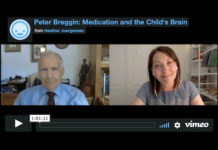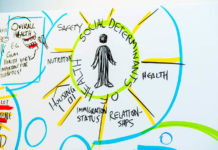Every few months I take in a “grand rounds” presentation in psychiatry to get a feel for what’s going on in the medical education of future psychiatric practitioners. (Grand rounds are a type of medical education lecture that often presents a “case study” of patients and their treatment.) Some say we’re turning a corner in the way psychiatry treats people, and I want to be hopeful that it’s true.
The topic this time was a relatively new “psychiatric access” project. I initially thought it might be about getting appointments for mental health services more efficiently. That might or might not be a good idea depending on the type of service to be accessed. But it turned out that it was actually a phone consultation (usually of about 15-20 minutes) between primary care physicians and psychiatrists. Primary care doctors are most definitely in the mental health business. For example, they account for 60-70% of the antidepressants prescribed in the US. There is no doubt that they often feel overwhelmed and under-resourced, especially for the more “complex” patients.
So the phone consultation would seem a welcome addition–something to make them more confident about their approach to mental health problems encountered in their clinics.
The grand rounds presentation included several case presentations to illustrate the use of this consultation line. The first example was an eight-year-old boy who had been in a residential program out of state. The pediatrician was rightly concerned because the boy was on 6 different medications including guanfacine, clonidine, fluoxetine, atomoxetine, risperidone, and dextroamphetmine. These drugs were prescribed for three diagnoses–ADHD, PTSD and separation anxiety. My first reaction was shock. While the subject of this part of the presentation was “Polypharmacy,” this seemed a generous understatement. I hoped for outrage at such a barbaric and harmful combination of drugs. I expected there to be a dramatic account of how this boy’s drug regimen needed a complete overhaul with an extremely careful deprescribing intervention beginning immediately. But that was not the message. There was no outrage. Instead, the presenter casually acknowledged that there were reductions in dosage and some change in medications needed.
Perhaps the nature of the short consultation, offered via telephone, precludes a more comprehensive treatment recommendation, or any regular arrangement for follow-up. However, if that’s the case, what’s the point? If all the “service” can offer is a shallow, quick overview, how does that help doctors care for patients in all their complexity?
Another case presented to illustrate the value of the phone consultation was that of a 30-year-old man living with his parents. He was on lithium for a bipolar diagnosis, but he was also on risperidone. One of the concerns was his weight (and the presenter expressed some concern about “symptoms needing more control” though he was not apparently in crisis). So the recommendation was to make minor adjustments in lithium and switch from risperidone to aripiprazole or quetapine. Again, perhaps it is a constraint due to the brevity of the consultation, but the entire focus was on medications. Is that the only factor at play? Shouldn’t even a bare-bones psychiatric call at least ask about some contextual factors? Why does this 30-year-old still live at home? Does he have a job? Are there alcohol or drug issues involved? Does he have anything other than symptoms—any strengths, any hopes for recovery?
In response to critics of psychiatry, doctors sometimes argue that medication is just a part of care, not everything. But if a grand rounds presentation intended to educate the profession doesn’t mention anything at all except medication, what are we teaching young therapists and doctors?
To the project’s credit, the presenter mentioned, though superficially, informed consent and quality improvement standards. The presenter mentioned the possibility of trauma being involved, though the estimate was that only 51% of the candidates for the consultations would have experienced it. These aspects of treatment could certainly be highlighted much more strongly than was apparent in this grand rounds presentation.
I was reminded of a comment someone very close to me, an orthopedic surgeon, made about psychiatrists. His assessment was that psychiatrists don’t function like real doctors, but they try to act like doctors. It felt a little harsh at the time, but this kind of “tinkering with meds” project suggested just that. Unfortunately, other physicians may defer to those with more specialized training—even when the psychiatrist is diagnosing over the phone, without a full grasp of the life context of the human being in the office. The “psychiatric access” project being described was no more than a quick medication consultation being done without even listening to the patient’s wants or needs, reducing their life to an unproven chemical imbalance.
Sadly, I’m not any more optimistic now about turning that proverbial corner from the medical paradigm to one that offers an evidence-based, humane and respectful interaction with our patients.















This is the song they play for psychiatrists at their graduation ceremony:
https://www.youtube.com/watch?v=Zyj1K5Lyr_Y
It’s called “riding the gravy train (with an exceptionally evil twist)”.
Report comment
I knew this song as a young teen.
Report comment
OK, I understand Nikkel asking “”How?” are we educating psychiatrists in medical schools?”, but I think a more appropriate question is *WHY?* are we educating psychiatrists in medical schools? The answer is, “So we can maintain the delusional fiction that psychiatrists are legitimate medical doctors.”
C’mon, Nikkel, you know it’s easier to maintain the fiction of psychiatry being a “medical specialty” if you include them in medical schools.
Psychiatry is a pseudoscience, a drug racket, – as shown here,- and a mechanism of social control. It’s 21st Century Phrenology, with potent neuro-toxins, – as shown here. Psychiatry has done, and continues to do, FAR MORE HARM than good.
Report comment
I think a more appropriate question is *WHY?* are we educating psychiatrists in medical schools?
That’s EXACTLY what I was just about to post myself (with quotes around “we” and “medical”). Now I don’t have to.
Report comment
Why do psychiatrists buy malpractice insurance? For the same reason.
Because going to medical school and buying insurance for malpractice are what honest-to-gosh doctors do.
Report comment
“Criminals have ‘smaller BRAINS’: Scientists claim the ‘handicap’ which can be spotted in early childhood may explain why life-long offenders lie, steal and are violent”
“Those who commit life-long crimes may have smaller brains because they do drugs, smoke, suffer poor mental health or have a lower IQ – more research is needed to find this out.”
https://www.dailymail.co.uk/health/article-8013069/Criminals-smaller-BRAINS-handicap-explain-offenders-steal-violent.html
Really didn’t need to look them up to know one of the authors is a psychiatrist the other a psychologist.
As Bradford reminds us this is: Phrenology.. a discredited ‘scientific’ research.
Let’s remind ourselves that almost ALL German psychiatrists murdered their patients during the second world war and that this Eugenics – a major crime against humanity resulting in 6 million murdered – was a born of Francis Gaulton.. polymath cousin of Charles Darwin.
The crime of psychiatry goes on in subjecting people to neurotoxic drugs – drugs brought to market through fraud and ghost written papers with big NAME psychiatrists to market the poison and justify force drugging… drugs which actually cause: suicide violence and homicide.
Report comment
Psychiatry is correct about the “chemical imbalance” theory.
THEY themselves create it, by the adding of chemicals to chemicals.
Besides, I think they are checking out of that theory, to focus more on the Mental Illness theory.
We won’t go into the reasons that an 8 year old boy is on chemicals….why no one spoke up,
we know why.
Which leads me to “consent” and the mention thereof. I guess they think that the people present do
not have an ability to think things out. Probably a point.
In fact, I think the profession comes to sites like MIA and looks at our comments, so as to try and form
new counterarguments.
Simply, because, they can’t start thought A which leads to B. Too much school, not enough education.
Report comment
“too much school …”. It’s more accurately described as “excessive synaptic pruning during the schooling phase”.
Report comment
You completely lost me with the title to this blog.
Who the the hell is the “WE” in the title.
The curriculum in ALL the schools training psychiatrist today is 100% controlled by a colluding alliance between the leaders of Big Pharma and the American Psychiatric Association – end of story.
What should WE expect to be the result of such oppressive power and control?
Richard
Report comment
Perhaps “How are psychiatrists being indoctrinated” would be the more appropriate question.
Report comment
yep Richard
Report comment
Until psychiatrists in medical schools will not study mobile communications, they have no right to make a serious diagnosis. Imagine that civil engineers will decide that all houses must be built under the moon light, to keep the architecture style of the city. In theory, maybe that sounds good but the walls will be crooked.
Report comment
Where did they ever come up with that 51% suffering from trauma statistic? The real answer is in the 80-90% range from everything I’ve ever read. Did he provide a reference or was he just spewing hot gasses from his mouth?
The “It’s not all about medication” meme is just a cover for the fact that “medication” prescriptions are 99% of a psychiatrist’s business these days. My experience (and I have a lot from advocating with foster youth) is that the vast majority of psychiatrists exist solely to prescribe and “monitor” drugs, though the term “monitor” must in most cases be used very, very loosely.
Report comment
Well, the shrinks get more money putting someone on a drug than overseeing medicating him/her. You wouldn’t want them to take pay cuts, rather than let their existing patients die, become (more) psychotic or turn into twitching wrecks, now, would you?
Report comment
Twitching wrecks make for better customers – you can sell 4-5 drugs at a time, and they don’t even have the wherewithal to object. And even if they do object, they’re “crazy” (oops, I mean “mentally ill”) and their opinion doesn’t count. It’s a win-win! Well, except for the client, I guess…
Report comment
Odd thing, however, is the psychiatrists claim to be completely ignorant of the fact that their drugs turn people into twitching wrecks, while also fraudulently claiming to “know everything about the meds.”
Report comment
Steve, That was the hilarious part.
LOL, seriously, who believes this chit?
So the guy says, um yeah, we see about 51% have trauma. But we use the same treatment for the non trauma and the 51% trauma. We know it’s 51% cuz we checked the files, and there were 49% that did not have trauma listed.
Besides, them using the word “trauma” in there is not without reason. They see people using that word in arguments, so they see where they can fit it, to try and pull wool over those non suspectin’ kind.
But they throw it in with such kooky sounding ‘observations’, none of it sounds plausible.
Why are they not selling used cars?
Report comment
Repression of trauma accounts for people thinking things are basically ok and just need to be tweaked, or we just need a different president, etc. I’d say it’s closer to 100& regardless of class/race/sex.
Report comment
https://pdfs.semanticscholar.org/ff6d/fcd15e2d58df4bf34660a12d488a4176c1eb.pdf
“The subject matter of psychiatry is neither minds nor mental diseases, but lies-the ‘patient’s’ and the ‘psychiatrist’s.”‘ These lies begin with the names of the participants in the transaction-the designation of one party as “patient” even though he is not ill, and of the other as “therapist” even though he is not treating illness. They continue with the lies that form the very substance of the discipline-psychiatric “diagnoses,” “prognoses,” and “treatments.” And they end with the lies that follow ex-mental patients like shadows through the rest of their lives-the records of imprecations and imprisonments called “depression,” “schizophrenia,” and “hospitalization.”3
The Nature and Scope of Psychiatric Lies
Report comment
That’s a very sad state of affairs in the psychiatric grand rounds, Robert. It should be illegal for the psychiatrists to be recommending prescriptions for patients that they’ve never met. Why is that not illegal?
Report comment
I’m sure you’ll probably get some song and dance answer, but it certainly should be illegal. One can only hope the doctor would give some version about knowledge on the Astral Plane that lets him and his colleagues do it. Then we’d know who the real psychotics are.
Report comment
I got a “real diagnosis” from a case manager with a BS in physical education. Stuff that’s not ‘sposed to happen is par for the course in “mental health.”
It’s a Kafkaesque bureaucracy based an a network of incongruous lies. So of course nothing in the Mental System makes sense.
Report comment
“a ‘real diagnosis’ from a case manager with a BS in physical education.” Pathetic. It is Kafkaesque.
Report comment
I will add that I went to see what they were teaching the counselors in, of all places, the seminary schools. And, it’s still strictly DSM “bible” – NOT Holy Bible – training, sadly. I did try to ask the person if they’d be making any changes, given Insel’s confession of the “invalidity” of all the DSM disorders. Her response, “he’s just one person.” I asked if she knew about Whitaker’s book, and all the children being misdiagnosed as “bipolar,” and she kind of pretended it didn’t matter. I pointed out the iatrogenic etiology of schizophrenia, she seemed unconcerned. She kept trying to convince herself that she benevolently “diagnoses” people. The bottom line, there are absolutely no changes in the training of the counselors either.
Report comment
It’s like a fundamentalist religion. The DSM believers have faith. They don’t need or want facts.
Report comment
My heart goes out to you, Robert Nikkel.
You mean well and want to help people. But you are working with a morally and cognitively bankrupt system–corrupt at its core. (Not all individuals within it are that way. Including psychiatrists. The system itself is based on a lie.)
Knowing what you know must make it that much more frustrating. Corinna West has expressed similar frustrations trying to work with groups like NAMI.
Report comment
Children by definition can not be mentally ill, only adults are expected to be able to control themselves ( in the battle between emotions VS intellect).
Dr. Szasz “the child mental patient is doubly disfranchised ”
said page 68 https://books.google.ca/books?id=2pduB22E43oC&lpg=PA68&dq=szasz%20psychiatric%20rape&pg=PA68#v=onepage&q=szasz%20psychiatric%20age%20of%20consent&f=false
Report comment
Don’t say “op” until you jump top, there is such a saying in my country.
Report comment
Removed for moderation.
Report comment